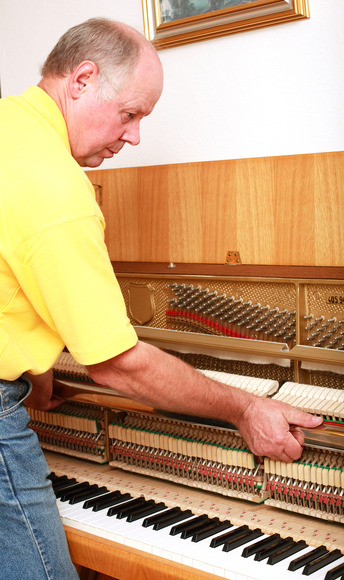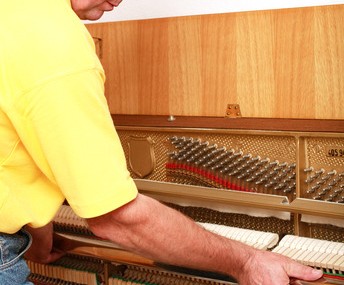What does tuning a piano mean?
Have you ever watched a guitar player tune his guitar before he plays? He adjusts the strings to make sure they are perfectly in balance and create harmony while playing. That’s the same concept with tuning a piano. Tuning consists of adjusting the tension at which the internal strings are stretched using a tuning hammer. They are tuned to vibrate at a pleasing harmony to match in accordance with other instruments and to give it aesthetically pleasing sounds when played.
How often should my piano be tuned?
Tuning a piano is really determined by a variety of things. First, how sensitive to the sound are you? Some musicians are automatically attuned to notes and can instantly tell when a piano is out of tune. Depending on your environment, a piano is sensitive to climate and the humidity and may need adjusting in highs and lows. How much do you play? For most people, one to three times per year is adequate. For a professional musician or an instructor, more frequent tuning is necessary. Concert pianos are generally tuned before every performance.
Why does a piano need to be tuned after being moved?
When you move, a lot of changes and stress occur during the process. Your piano may experience bumps, thumps and impacts as it makes its way from your old location, into the truck, and into your new location. There may also be a change in climate and humidity. Vertical pianos may be affected by unevenness in the level of the floor, or differences in the level between old and new locations.
Should a piano be tuned immediately its in its new location?
There is an art to moving a piano and tuning a piano – they usually aren’t performed by the same person. And in most cases a piano adjusts over time to its move and its new location. A piano may sound fine when its placed in its new home, yet a week later sound out of tune. Its best to move a piano and let it settle in. Then a week or two later hire a piano tuner to bring your instrument up to its full potential.
Is there a “best” location for my piano in my home?
The best location for your piano is in an area where temperature and humidity will remain as constant as possible. Try to keep your piano away from big drafts, open windows and direct sunlight. You should also place your piano away from heating registers, radiators, windows or doors that will open and close on a consistent basis.
Can I play a piano that is out of tune?
Of course any piano can be played. Depending on your ear, you may not like the music that comes from the instrument. All pianos go out of tune continuously. If your child is trying to learn on a piano that is out of tune, she may not practice at the same level as if it were in tune. When she “hears” the way its supposed to sound at the instructors location, and has trouble making the same sounds in her home, frustration can soon set in. Quality does matter when trying to master individual pieces of music.
Is there anything I should do before a piano tuner comes to my home?
In order to tune your piano, the technician will probably need access to the entire piano. Remove sheet music, knickknacks, plants, decorations – anything sitting on any piece of the piano so access is quick. You may even vacuum underneath a grand piano, as the technician may have to lie under it to make an adjustment. Make a list of anything you’ve noticed. And make sure the surrounding area is quiet and well lit to allow the technician the easiest time possible to complete his work.



Speak Your Mind